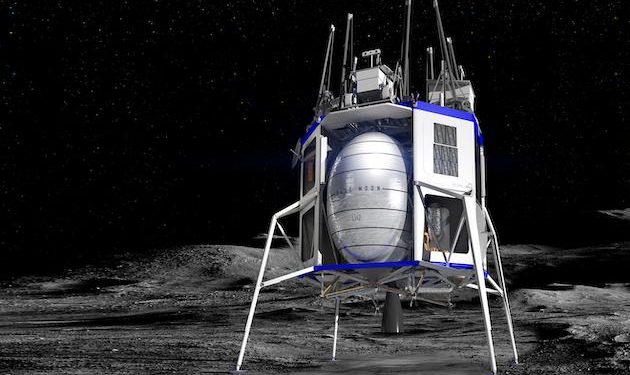- Blue Origin owner Jeff Bezos has offered to pay up to $2 billion in NASA costs if the space agency awards his company a contract to develop a spacecraft to land astronauts on the moon
- In April, Elon Musk’s SpaceX received a $2.9 billion contract to build a spacecraft to fly astronauts to the moon as early as 2024, rejecting bids from Blue Origin and defense contractor Dynetics
- The space agency said SpaceX was less expensive than competitors, noting its proven record of orbital missions and other factors
SEATTLE, Washington: Blue Origin owner Jeff Bezos has offered to pay up to $2 billion in NASA costs if the space agency awards his company a contract to develop a spacecraft to land astronauts on the moon.
In April, Elon Musk’s SpaceX received a $2.9 billion contract to build a spacecraft to fly astronauts to the moon as early as 2024, rejecting bids from Blue Origin and defense contractor Dynetics.
The space agency said SpaceX was less expensive than competitors, noting its proven record of orbital missions and other factors, in a contract decision that senior NASA official Kathy Lueders called “the best value to the government.”
However, in a letter to NASA Administrator Bill Nelson, Bezos now promises that Blue Origin would waive payments in the government’s current fiscal year and the next one, up to $2 billion, and also pay for an orbital mission to test its technology.
As part of a lunar contract, Blue Origin would also accept a fixed-priced contract and pay for any system development cost overruns, Bezos said.
“NASA veered from its original dual-source acquisition strategy due to perceived near-term budgetary issues, and this offer removes that obstacle,” Bezos wrote.
“Without competition, NASA’s short-term and long-term lunar ambitions will be delayed, will ultimately cost more, and won’t serve the national interest,” Bezos added.
Earlier, Blue Origin filed a protest with the U.S. Government Accountability Office, accusing NASA of giving SpaceX an unfair advantage by allowing it to revise its pricing.
The GAO’s decision is expected by early August, though it is unlikely that NASA will reverse itself.
Before choosing SpaceX, NASA sought proposals for a spacecraft that would send astronauts to the lunar surface and return them to Earth.






